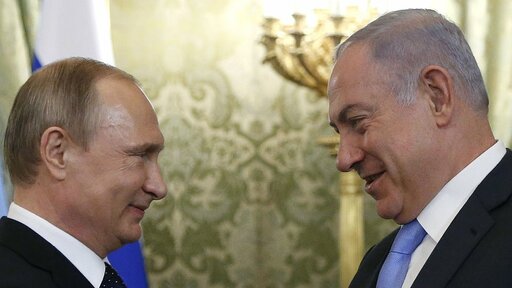On negotiations – Anshel Pfeffer in Haaretz:
‘Israel also has a discreet agreement with Russia that their security forces don’t carry out assassinations on either country’s soil, so Ukrainians would be at least safe there.
But even if such talks were to take place, would they have any chance of reaching a solution in the ongoing conflict? Could Israel realistically help as either host or mediator?
For negotiations like these to succeed, two conditions are necessary: both sides need to come prepared to make a deal; and the host or mediator needs some leverage to cajole them toward doing so.’
(…)
‘But with the invasion in its fifth day and Russia’s numerically superior forces still struggling to achieve their objectives, and with the Western world – even Germany – finally united in punishing Putin’s Russia with unprecedented sanctions, perhaps even he may be looking for a way to climb down.
It would still be an intricate formula, one as yet unimaginable, that would allow Putin to order his forces back to their bases without him losing face. Israel, though it now plans to vote in favor of the United Nations General Assembly resolution condemning Russia, is still uncommitted in this conflict. However, does it have any leverage were it to serve as mediator?
Since 2008, when Putin embarked on his campaign to prevent former Soviet republics from getting too close to the West when he invaded Georgia, Israel has remained painfully neutral.’
(…)
‘This policy was reinforced in September 2015 when Russia sent its military contingent to Syria to save the Assad regime. The feeling at the time in Israel was that Russia could end Israel’s relative freedom to attack Iranian targets within Syria, and therefore Israel had to be extra-sensitive to Moscow’s ambitions.
Then-Prime Minister Benjamin Netanyahu took that policy to absurd lengths, seeking to create the allusion that he had a “special relationship” with Putin – even putting photographs of the two leaders together (along with others of him with Donald Trump and Narendra Modi) at the heart of his second election campaign in 2019.’
(…)
‘Russia may be a military power, but it lacks the capabilities to maintain and reinforce a large mission far from its borders. It has kept Assad alive with relatively limited means: a couple of dozen combat aircraft, an anti-aircraft battery, and a few hundred mercenaries and special-forces operatives. That would not have been enough to prevent Israel from flying in Syrian airspace.
Israel’s concern for Russia’s Jews, while justified, is also a misread of Russia’s president. Putin has closely studied the reasons for the collapse of the Soviet Union and believes that one of them was its antagonism of Jewry, which he sees as a global power.
Jewish advisers and oligarchs are central figures in his inner circle – including, of course, Roman Abramovich, the Russian-Israeli billionaire who is now anxious to salvage his credibility by proposing to help in mediations with Ukraine. This is a rather blatant PR move as the Ukrainians are extremely unlikely to trust the man Putin once called “our oligarch.”’
(…)
‘For that to happen, though, Israelis need to see through the image Netanyahu has built of Putin as an omnipotent genius that Israel must never cross. The chances of that happening in the near future are remote. Bennett seems as awestruck of Putin as Netanyahu was.
It would probably be best for Israel not to put itself in the position of mediator. Besides, as a country that has avoided negotiations over ending its own occupation, it might be a little awkward to try to resolve another one.’
Read the article here.
So, Putin won the war in Syria thanks to Israel. (‘It has kept Assad alive with relatively limited means: a couple of dozen combat aircraft, an anti-aircraft battery, and a few hundred mercenaries and special-forces operatives.’) Winning the war in Syria, which I would say enlarged Putin’s hubris was a relatively small operation.
And indeed, it would be bizarre if Israel would mediate between Ukraine and Russia, since it failed to come up with a sustainable solution for the Palestinians who live under its control.
And the awe of Putin of many, even quite a few of his enemies, might be based on misunderstandings and myths that still have to unravel.
